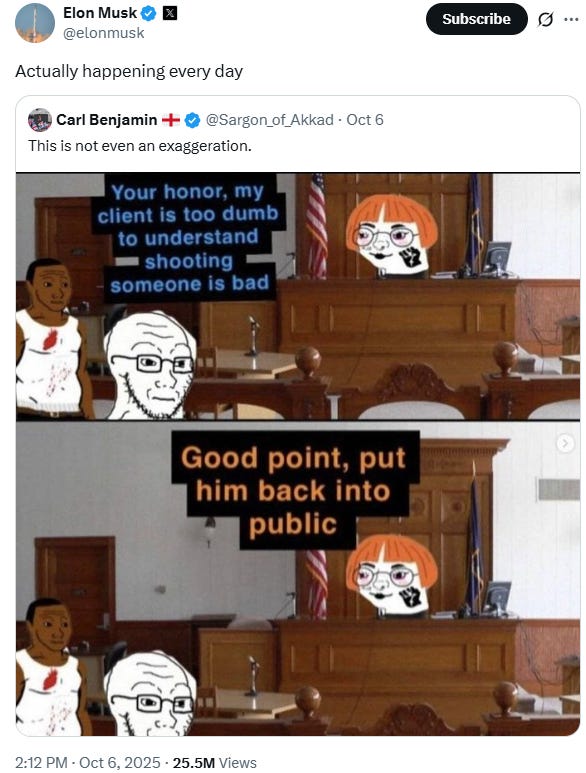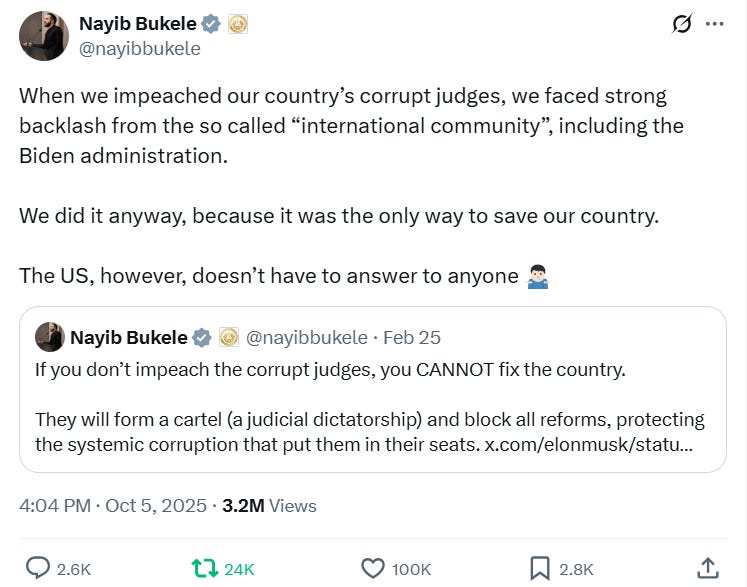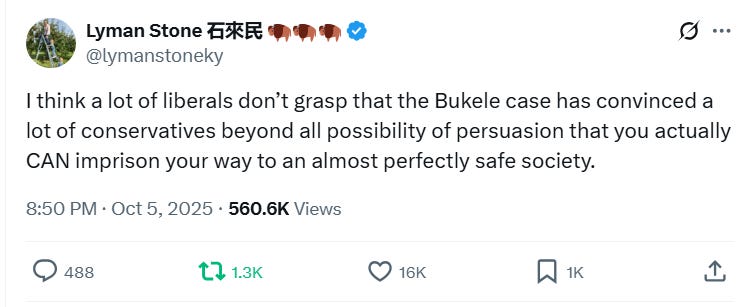Is This How We Get Fascism?
It won't be called that by the right, but conditions are ripe for a tilt toward authoritarianism in the U.S.

Lincoln, FDR… and Trump?
Curtis Yarvin is arguably the most influential political theorist on the right. In his latest post (“You Can’t Handle The Truth”), he argues (in his typical, hyperbolic way) that the Trump administration is failing by not seizing absolute power:
Politics is fundamentally about power. In power, large things are easier than small things.
[…]
Getting rid of all the liberal judges is easier than getting rid of all [Sic] one liberal judge. Getting rid of all the judges is easier than getting rid of all the liberal judges. Getting rid of the whole legal system is easier than getting rid of all the judges. Getting rid of the whole machine of government is easier than getting rid of the whole legal system. Getting rid of the whole philosophy of government is easier than getting rid of the whole machine of government.
While I don’t think Yarvin really thinks its possible to get rid of the whole machinery of government, he has in the past offered more realistic examples of extreme executive power in the American context: Lincoln and FDR. He just doesn’t think Team Trump has it in them to grab those reins.
I’m less sure. Taken together—China’s meteoric rise, public backlash to progressive criminal-justice laxity, open attacks on federal immigration enforcement, and Nayib Bukele’s example in El Salvador that “you can just do things”—the political weather is shifting in ways that make a Lincoln/FDR-scale assertion of executive power more likely.
ICE As A Stress Test
Deputy White House Chief of Staff and Trump senior adviser Stephen Miller argues that ICE facilities are federal property executing a federal mission and that the President has undisputed statutory and constitutional authority to deploy troops or other federal protective assets to defend them—even if a district judge objects (post).
That isn’t abstract. The point of the attacks against ICE is to disable the mission—pushing agents into a defensive crouch instead of removing unlawful entrants. The attacks on ICE are left-wing street violence aimed at nullifying a federal mission—ramming ICE vehicles, blockades, arson attempts. History suggests that leftist street violence against state functions often licenses an authoritarian response—think Italy’s Biennio Rosso feeding the Fascist consolidation, or Weimar’s street battles eroding tolerance for paralysis. The U.S. isn’t Weimar, but politics rhymes: the more the situation reads as state incapacity under siege, the stronger the permission structure for extraordinary executive measures.
Expect federal force-protection to be treated as a national template, not a one-off.
The Corrosive Effect Of Avoidable Crime
Despite being the richest man in the world and America’s greatest industrialist, Elon Musk has been fairly mainstream politically for most of his life, so he is something of a bellwether. As you can see by the X post he quoted below, he has drifted right on law and order.
A run of high-profile homicides by repeat offenders seems to have shifted public opinion. When the median voter doubts basic order, arguments for expansive executive power get easier to sell. And Stephen Miller did a good job of selling the role of the federal government in cracking down in crime in his speech in Memphis last week, as I noted then.
The Bukele Effect
When Nayib Bukele purged corrupt judges and then “imprisoned his way” to public safety, he took heat from the “international community”—and did it anyway.
And the results speak for themselves—or they would, if Bukele didn’t speak for them.
As Lyman Stone notes, that case has convinced many non-liberals that near-total safety is achievable with willpower and prison cells.
El Salvador’s example proves that tolerating crime at our level (we have a homicide rate 6x that of El Salvador) is a policy choice, and an increasingly unpopular one, at that.
The China Syndrome
Video of China’s new Huajiang Grand Canyon Bridge has been a wakeup call for some Americans online.
The extent to which China has surpassed us has finally dawned on them. That’s a point I expanded on in a post last week.
At about the same time China opened that spectacular new bridge to traffic, America drove the first test pile in the riverbed where the Francis Scott Key Bridge was wrecked 18 months ago.
China opening the world’s tallest bridge while we haven’t even started rebuilding an unremarkable bridge that collapsed a year and a half ago is emblematic of China’s recent trajectory versus ours.
Dan Wang’s Breakneck echoes this theme in book form. In a recent X post, “Yung Macro” shared some figures from it:
China now adds more solar capacity every month than the U.S. has installed since Edison. By 2035, Shenzhen alone is projected to be producing 97% of global EV batteries, 85% of industrial robots, and roughly 900 times as many drones as the rest of the world combined. Shipyards in Dalian and Shanghai are already delivering the equivalent of one Royal Navy per quarter.
But it’s not all doom and gloom — on the other side of the ledger, the United States maintains a commanding lead in Twitch streamers and podcast hours per capita. The balance of global power, as such, is set to remain uncertain as ever.
Alex Almeida put it in starker terms:
Every single index of industrial production looks like a US vs German and Japanese production of multi-engine bombers 1940-1945 chart. Folks don’t fully grasp how massively over it is.
I argued last week that China has already surpassed the U.S. on the metrics that matter. If that’s true, policies we tolerated in the unipolar moment—mass, dysgenic migration; leftward turns on race, crime, and gender policy—look like luxuries of hegemony we can no longer afford.
The Left’s Response: Throw In The Towel
A number of left-leaning accounts praised a guest essay published in the New York Times over the weekend (“The West Is Lost”). In that essay, sociologist Andreas Reckwitz suggested that the West’s postwar prosperity was largely a fluke and that we should reconcile ourselves to lower living standards.
The Right’s Response: Change Course
When I was in high school back in the 20th Century, a social studies teacher explained the American political spectrum in a way that flattered liberals like himself. He analogized American society to a car experiencing some trouble, and suggested the following as representative political responses, with the liberals being the most pragmatic:
Far Left: “You need a new car.”
Center Left: “You need to replace this part.”
Center Right: “The car’s fine; you’re just driving it wrong.”
Far Right: “They don’t make them like they used to.”
Today, liberals are no longer pragmatists. Professor Reckwitz isn’t telling you how to fix your car—he’s telling you to get used to waiting for a bus. Pragmatism is now the province of the right, where comments on Reckwitz’s post such as this one were representative:
This article is so fucking funny
“The west can’t grow anymore... we’re becoming tangibly poorer”
“Have you tried not doing things that make you tangibly poorer?”
“Nope, we should just tell everyone to accept declining living standards forever”
If Trump Were Going To Consolidate Power…
What would he do first? Forget the silly stuff like removing all the judges—let’s be practical here. I’m no political theorist like Yarvin, but a couple of steps seem obvious:
Purge potentially disloyal federal workers, particularly those with guns.
Hire federal workers who are likely to be loyal, particularly those with guns.
The Trump administration has already taken steps on both counts. Trump’s FBI director Kash Patel has fired agents who were photographed kneeling for Black Lives Matter. Democratic Senator Dick Durbin claimed last month that Patel had purged thousands of agents. And Trump’s Secretary of Defense, Pete Hegseth, has fired a number of senior officials, most recently, the Navy’s Chief of Staff. Hegsteth’s recent speech to hundreds of general and flag officers looked like him setting the table to cashier more of them.
On the addition side, there’s ICE. When fully staffed, it will have about 22,000 armed agents—about the size of two U.S. Army divisions. And given their primary mission, rigorously enforcing immigration laws, they are likely to be ideologically aligned with and loyal to President Trump.
Pessimists Sound Smart; Optimists Make Money
That old saying from finance comes to mind when reading Curtis Yarvin, though perhaps “cynic” is a more fitting description in his case. He even suggests a cynical motive for Stephen Miller:
The reward for Stephen Miller and his ilk is also on earth. They look tough. They’re doing something. That they are not even doing 0.01% of what it would take to solve the problem—that, at much more risk to themselves, the most they could probably do is 0.05%—matters not. They can milk it as far as it goes. They, too, will sell books.
Of course, the odds of the Trump administration failing and Stephen Miller getting to sell books afterwards are very low. Yarvin himself acknowledges as much elsewhere in his piece:
Because the vengeance meted out after [The Trump administration’s] failure will dwarf the vengeance after 2020
So it’s a burn-ships-moment. I’m betting on Cortez (metaphorically; literally, I’m betting on a crackdown, deportations, reindustrialization, etc.).








I knew I subscribed for a reason. You see it so clear. This is a different kind of fight now in the 21st century. The US-China great power competition was enabled by the very globalists who want to erase the traditional west and rule over a region of commercial slave colonies. China is the governance model they want for the west and the world.
We might not be as fast in some respects, since they are a totally unitary state, the Trump administration is marshalling resources toward top national security priorities. I wouldn't be surprised if AI hyperscaler capex is partly a function of government-industry national security collaboration. The state will need to give strategic direction to the market to compete in the 21st century.
Trump doing what he has done taking equity stakes show just how clear some members of his team see the field too. The risk is going too far, as you astutely note.
Aside from not going after the string pullers (the same group who controls the CIA and always gets a free pass) Trump is doing a good job; there’s only so much he can do